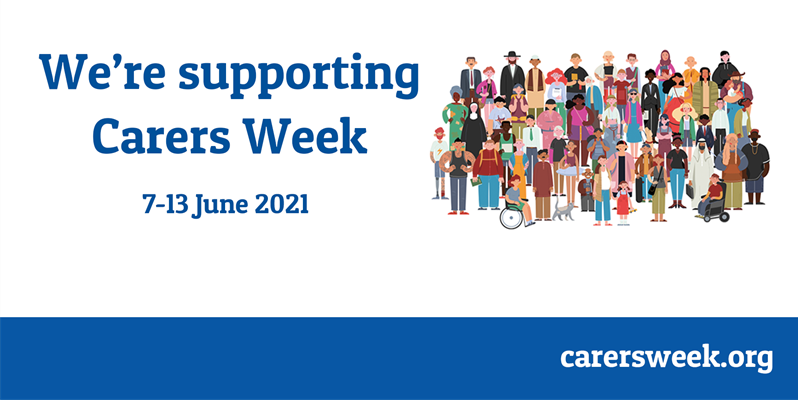Carers Week is an annual campaign to raise awareness of caring, highlight the challenges unpaid carers face and recognise the contributions they make to families and communities throughout the UK. The theme of Carers Week 2021 (7-13 June) is ‘Making Caring Visible and Valued’, recognising the vital contributions made by carers and helping them get the practical, financial and emotional support they need to care for a loved one. Caring will touch each and every one of us in our lifetime, whether we become a carer or need care ourselves. Whilst caring can be a rewarding experience, it can also have a huge impact on a person’s health, finances and relationships.
At Brighton and Sussex Medical School (BSMS) as part of The Ethical Preparedness in Genomic Medicine project (a Wellcome Trust Collaborative Award in Humanities and Social Science), Professor Bobbie Farsides and Dr Rich Gorman have been working with people who have shared experience of caring responsibilities within families touched by genetic conditions. Whilst the application of genomic technologies has the potential to transform patients' lives, the excitement around these technologies mustn't eclipse the everyday experiences of the people who live with, and care for, those with genetic conditions. The Ethical Preparedness in Genomic Medicine project aims to understand what those with experience of rare health conditions think professionals, policymakers and the public need to know about what matters to them. The project is examining the overlaps and gaps between practitioner and patient accounts of ethically relevant issues and will be translating the research findings into resources that contribute directly to good clinical practice, enabling people to feel more comfortable to have challenging conversations.
As part of this, the research team have been working with writer and life-writing tutor Fiona Mason to equip participants with the skills and confidence to use creative writing methods to explore their experiences of caring. The aim was to enable people to convey how they (as patients, families and carers) live their everyday lives outside of healthcare settings. The project wanted to provide an outlet for examining carers' hopes, expectations, worries and reflect on what everyday life is like at a time when so much focuses on the promise of genomic medicine.
Many of the stories that have emerged from the group have touched on the complexities of caring for people affected by genetic conditions.
Peaches
The other half of the family have dashed off to play cricket, and then to Cubs, leaving half-finished plates and shouted promises: “I’ll do it later!”. You and I are sitting in the abandoned kitchen, still working our way through your dinner, as usual. Shadows start to tiptoe into the bushes beyond the window, adding to my left-behind feeling.
You make a grab for the empty spoon, catching my hand. This is rare and not always intentional. But tonight I really feel you’re saying “I’d like more fruit please”. I reach in close with the near-empty dish. We scoop the next spoonful together, wobbling a bit, into your waiting mouth. As the juice runs down your chin, there’s a hint of a smile on your lips: I had understood correctly!
The tiniest of victories. But my heart breaks just a little bit more.
In Carers Week 2021 we want to honour our participants and make a start in fulfilling their hopes of being better heard. To quote some of the members of the writing group:
“Carers have a lot to say, if they can ever find the time to say it! This course has given me permission to sit and contemplate, and new techniques to capture my thoughts in ways that resonate with other people. I hope we'll reach a big audience and in doing so, show them what it's really like to care for someone with a rare health condition."
“Caring for a child with an undiagnosed genetic condition involves trying to explain the unexplainable to every professional you meet. Working creatively as part of this research project has given me time, space and a medium to reflect on and express what professionals really need to understand about the impact of being involved in a genomic project on my child and our family.”
Writer and life-writing tutor Fiona Mason, whose own memoir 36 Hours chronicles her experience of caring for her husband at home during the final days of his life, explained how writing can help raise awareness of the contributions of carers:
"It has been an absolute joy working with a group of such inspiring participants on this BSMS project. During the programme I have been impressed and humbled by the commitment people have shown to sharing their lived experience. There’s been a strong sense of peer support and trust that has grown in the group as week by week people have found new ways to approach self-expression. There’s a strong tradition of writing as a form of catharsis. But life writing is more than that. It’s an intentional act of communication, carefully finding the right words and form to convey lived experience. When others bear witness to our experiences, we feel seen and heard. For carers who often face isolation, loneliness and exhaustion, having one's experiences validated makes a huge difference. It’s a privilege to have walked alongside this group and help them take a few more steps in their writers’ journeys.”

Find out more about carers week here >